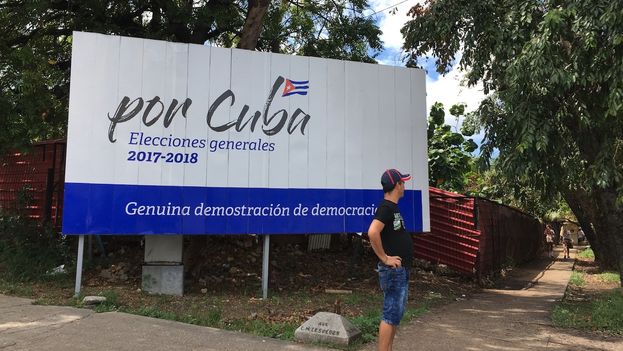
![]() 14ymedio, Havana, 13 March 2018 – Cuban authorities prevented independent election observers from accessing vote counting in several polling stations in the country, according to complaints received by 14ymedio from organizations that tried to send observers to the polls.
14ymedio, Havana, 13 March 2018 – Cuban authorities prevented independent election observers from accessing vote counting in several polling stations in the country, according to complaints received by 14ymedio from organizations that tried to send observers to the polls.
Arbitrary arrests of opponents also marked the day, in which there were dozens of detentions.
The Cuba Decides initiative, whose most visible face is Rosa María Payá, denounced to 14ymedio that 27 people who collaborate with the project were detained until noon on Monday “to prevent them from observing the counting of votes or voting.”
Payá, who splits her time between Havana and Miami, said that of the boycotters, “22 belong to the Patriotic Union of Cuba (UNPACU)” and the rest are members of other groups or do not belong to any organization, as is the case of Adonis Milan, a young dramatist arrested this Sunday.
Among the UNPACU activists of who were arrested was the capital city’s coordinator of that opposition organization, Zaqueo Báez Guerrero.
According to Payá, the observers who support her initiative had planned to go to 65 polling stations, but “at least five teams were not allowed to enter or were denied the information during the vote, another 10 were ‘besieged’ ” – kept from even approaching the polls – “and at least 12 were arrested,” she said.
In addition, there were 14 cases of observers who could not vote after being expelled from the polling places. Individuals in plainclothes frightened them with statements such as “counterrevolutionaries do not vote.”
The observers were able to access 24 polling stations distributed across six provinces, where they observed that at least 36.68% of the voters annulled their ballots or did not go to vote. But in another 29 polling station they were forbidden to witness the voting.
The Cuba Decides project believes that this figure translates as “the rejection of the system” of Government and “the support for the campaign” promoting a plebiscite on a multi-party system with free and fair elections. This rejection was tangibly demonstrated by voters who wrote the word ‘plebiscite’ on their ballots.
Citizen Observers of Electoral Processes (COPE) denounced that some of its members were “cited, threatened or are now detained” for their observation work.
COPE lined up more than 170 members in the 15 provinces of the country and the special municipality Isla de la Juventud to be election observers, as explained in a statement from the organization.
The statement said that with the blocking of its observers, the Cuban government perseveres “in the punctilious destruction of its own legal and constitutional regime” when it excludes citizens who think differently.
According to Pedro Acosta, member of the Observers of Election Rights (ODE) group, about 60 observers of this initiative worked on Sunday, although five of them were blocked from fulfilling their mission.
Acosta laments the repressive climate that surrounded these independent organizations that sought to monitor and observe the election process. “Near the cubicles where voters fill out their ballots, there were people watching how long each person was delayed.”
The elections, with more than eight million Cubans qualified to vote, were organized to ratify the 605 deputies to the Parliament and the 1,265 delegates to the 15 Provincial Assemblies of People’s Power and are the last stage for the transfer of power that will end the presidency of Raúl Castro. At this stage of voting there is only one candidate for each open seat, and the ballot simply asks each voter to ratify the candidates. Voters can choose not to vote yes, leave their ballots blank, or annul their ballots by writing other things on them.
The independent civil society denounced the lack of plurality of the Cuban Parliament and some organizations, such as the United Antitotalitarian Forum (FANTU), led by Guillermo Fariñas, called on citizens not to join the “electoral farce.”
____________________
The 14ymedio team is committed to serious journalism that reflects the reality of deep Cuba. Thank you for joining us on this long road. We invite you to continue supporting us, but this time by becoming a member of 14ymedio. Together we can continue to transform journalism in Cuba.
